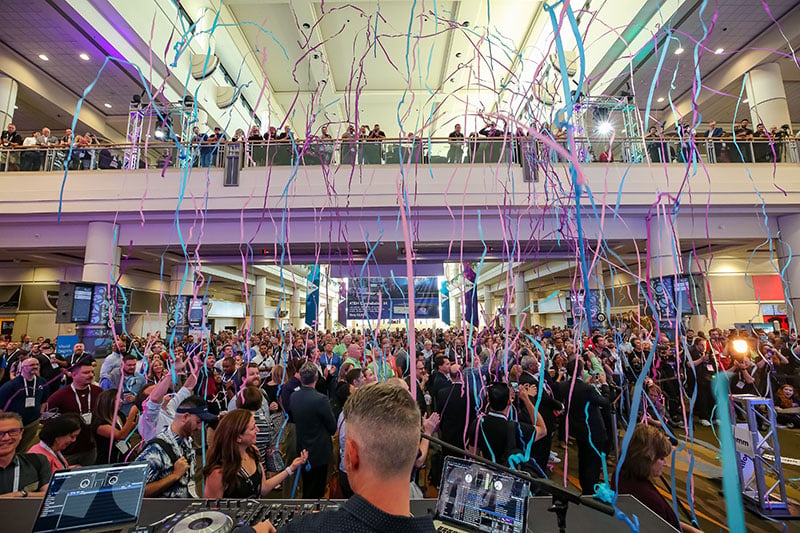AV Integrators Regroup: Affirming Trust Through Communication
By Brad Grimes

As societies worldwide get back to business, with the coronavirus pandemic still ongoing, AV companies are ready to work. Many never stopped working. In much of the United States and elsewhere, AV integrators were deemed essential under the umbrella of telecommunications and construction professionals, and could therefore continue working where customers invited them in.
Doing so has required making adjustments, adhering to local regulations, and working with clients to keep their health concerns front-and-center while also delivering the AV and communication experiences they seek. Now, those same considerations will guide them through a phased reopening.
Operating in Smaller, Familiar Workgroups
Social distancing — maintaining adequate physical separation from others in order to minimize chances of the virus spreading — has been an important part of efforts to manage the pandemic. Contact tracing — being able to identify individuals who may have been exposed to infected people — is another. To minimize exposure to and transmission of the virus, U.K.-based AVMI has been breaking its team into pods of professionals who move from project to project together. The same, small groups work together on each project, rather than creating new teams on a per-project basis.
“We probably have 20 to 30 engineers working at any one time, but we're not sending them ad hoc to work on different sites,” explains AVMI Engineering Director Justin Paveley, CTS®-D, CTS-I. “What we’re doing is something we’re calling ‘cohorting.’ We're limiting the team and breaking it into pods, which include different skill sets like commissioning and installation. Essentially, they work together. That way, if a member of staff unfortunately falls ill, we at least know who they may have affected. And we’re limiting contact among members of our team.”
RELATED: AVIXA Webinars | Returning to the Workplace in a World of Heightened Sensory Awareness
COVID-19 will not only change the way we work, it will change how we interact with people and physical objects.
In Texas, where communities remained more open than in other parts of the country, thoughtful deployment of techs was front-of-mind, but so was ensuring they stayed healthy away from jobsites.
“The majority of the work can be done in pairs of two,” says Luke Jordan, CTS-I, Vice President of Fort Worth, Texas-based Electro Acoustics. “If I'm doing a big wire pull, I might have three people on it: one cutoff person in the middle, one feeding [the cable] and one pulling it. But none of them are in the same room at that point.”
And while maintaining safe distances on project sites has been key, Jordan says doing so away from work is also important. “A commitment we all made to each other was we weren’t going out and hanging around with other people,” he says. “Because if one person gets sick, it can affect us all.”
He says that fortunately, none of Electro Acoustics’ 30-person staff has contracted COVID-19, but the company has been vigilant throughout the crisis. When one staffer developed a fever, that staffer and four others he’d been in contact with were sent home. None developed symptoms and the one staffer’s temperature quickly returned to normal.
“But by committing to being on the job, so that everyone can pull a paycheck and provide for their family, part of that is sacrificing who you're spending time with when you're not on the job,” Jordan says. “And that's been worthwhile.”
"“It's been all about communication,” says Warnick. “Right down to saying, ‘I've been healthy. My temperature is normal. How about you?’ Our people have learned how to be transparent and how to disclose."
Keeping Communcation Lines Open
Since the pandemic began and local jurisdictions took measures to control its spread, AV companies say they’ve been communicating more — about work, clients, and each other.
Jordan and his colleagues start every day by taking their temperature and logging it into an electronic form the company created. If it’s high, they’re required to notify the company’s general manager and consult with a telehealth professional. “We've just been very aware,” he says, “very connected with our local governance to figure out, for our area, what we can and can't do.”
“It's been all about communication,” says Warnick. “Right down to saying, ‘I've been healthy. My temperature is normal. How about you?’ Our people have learned how to be transparent and how to disclose. And it's not just on the project manager level, but also at the tech level. The planning and communication that have come out of this are going to be a huge game-changer for us.”
When the coronavirus first appeared on companies’ radars, Soutionz was holding its annual sales conference and word began spreading about possible supply chain issues.
“So, we got word out to all of our offices, ‘If we have things that are going to start in the summer, then make sure we have everything we need,’” Warnick says. The executive team also started holding daily briefings to assess the situation in each of the regions it serves. And it launched a COVID-19 hotline, with a dedicated email address, for employees to use. “If anybody had problems getting essential items like hand sanitizer or toilet paper, they could light up this network of people throughout the country.”
RELATED: InfoComm 2020 Connected | How the AV Community can Give Back in Times of Crisis
During the COVID-19 crisis, the AV industry has played a crucial role in caring for communities and keeping people connected.
At AVMI, management wanted to know how employees thought they were handling the situation and how they could improve. To that end, it conducts regular surveys, which Paveley says helps the company understand not only how people feel on a personal level, but also how the company has performed with regards to safety. Have people been issued the right equipment? Have they got the right safety documentation? Do they understand it? Is their transportation situation okay? “We keep saying, communication, communication, and communication are what get us out of situations like this and help us learn,” Paveley says.
READ NEXT: AV Integrators Regroup: Giving Workers Peace of Mind





